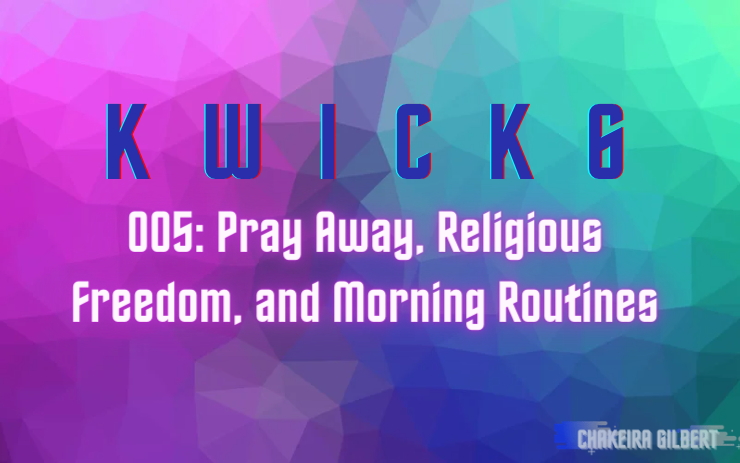KWICK 6: Pray Away, Religious Freedom, and Morning Routines

Just a heads up, KWICK 6 #005 is very Christian heavy this week. I tend to read and watch things in blocks. The Color of Compromise has been at the forefront of my mind so I tended to read and watch things that made me think more about my religious beliefs. Either way, I hope you enjoy.
Thought of the Week:
I have been trying to get a sustainable morning routine for the last couple of weeks. I am not a morning person, and with the days getting shorter and cooler, it is getting harder to get out of bed. I naturally wake up around 7 am on the weekends, but during the week, I need a morning routine to help ease into the morning and work day. After experimenting with the routine, I think I have a simple routine. We will see what adjustments I need to make over the next few months.
What I've Consumed:
Can We Pray Away Desires?
Pray Away is a Netflix documentary that follows the early days of an organization that was meant to "help" people pray away same-sex attraction. It also draws a line to how it continues to this day in new forms. It hits on ways conversion therapy can be harmful. One thing that stood out to me was the abundance of shame many people displayed. It also shows that a lot in the church has not changed. Instead of walking with people, we shun them and make them believe that God is a magician who will take away all sinful desires. Straight or gay, we all struggle with something. My struggle may differ from others, but it is a struggle nonetheless. I remember reading a post that commented on the difference between being a Christian and practicing Christianity. I thought that was profound. More Christians need to remember this is a lifelong journey we are practicing, but we are never perfectly following Jesus. There is always room for improvement. Freedom in Christ does not mean there are no temptations and no struggle. It doesn't mean there are no desires.
Another thing that stood out and that generally stands out is the language used. When I hear Christians speak, it is mainly in a "war" like manner. Someone is always taking away our rights or persecuting us. Christians have to fight back. But then I remember Jesus, who turned his cheek and talked about servanthood. Instead of focusing on a "war," why not focus on serving our neighbors and letting God change their hearts, desires, and actions? A lot of Christians, in their excitement and strong beliefs, try to "fix" problems. We aren't the fixer; Jesus is. He does the work. We plant a seed. Instead of trying to fix it, why not be a friend? Or invite the person to our home. Or go where they are. Instead, we start by telling them what is wrong, not the Good News. I think we will significantly change when we allow God to do the work.
While I did not agree with everything in the documentary, It did get me thinking. As Christians, we must acknowledge the harm we do and the good. I recommend the documentary.
Know the Market and Get Good Leaders
I read an article called How a New Anti-Woke Bank Stumbled. This article is about a start-up called GloriFi, which aims to be a bank for pro-conservative and American values such as capitalism, family, law enforcement, and the freedom to celebrate love and country. The start-up's issues came down to poor management of personnel and finances. While the company is still struggling, bankruptcy has been considered a viable option.
What is interesting to me is the founders have no background in banking or banking technology. It is easy for men, especially white men, to receive start-up funding regardless of the high risk. In my opinion, this is a high-risk investment. The article highlighted that there were issues from the jump, and they spent the money in poor ways. This is not the first "pro-conservative" business I have read about that is having issues after raising millions of dollars to get started. They have all stemmed from the idea that conservatives are being discriminated against in the marketplace, and they need a place to congregate with like-minded people. I have no issue with that sentiment (although the discrimination language is pushing it); however, many of these companies are started by people with little experience in the sector and seem to do little research. Is it possible to be a "conservative" or "Christian" company today? Yes. I always come back to Chick-fil-A in these types of discussions. They are widely known as a Christian company that believes in biblical marriage. However, people still go to them and still make money because of how they treat their customers. They haven't had any business ethical failings from what I can remember. Good customer service goes a long way.
Does Religious Freedom Depend on a Secular Government?
I came across the below post on Instagram. I am unsure of my full thoughts, but this came to mind. One issue is that when we have a religious government, the government suppresses others' choices regarding their belief. History has taught us that regardless of religion, most times, a religious government subjugates other belief systems. While many Americans staunchly believe America is a Christian nation, this is the same country that decimated the Native American population, fought a war to preserve slavery, and did not allow Asians to either enter or reenter the country. Church and State have been separate for a reason. So do we need to have a secular government to have true religious freedom? I am not sure. No government is completely religion-free because religious people are in the government. Still, regardless of my beliefs, I think it can get dangerous for people when one religion is at the top of the food chain in governments and the courts. I would love to hear your thoughts.

📚 Currently Reading:
The Color of Compromise: The Truth About the American Church's Complicity in Racism by Jamar Tisby
- 40% completed. I've been putting off other books because of this book. It is a difficult book to read even though no new information has been presented. Two points that stood out to me are 1) the enslaved had no agency over their body even in death, and 2) arguments have not changed much over the centuries. I already have so many highlights in this book, and my mind is already connecting it with other books I've read. It is a good book so far.
Building a Second Brain: A Proven Method to Organize Your Digital Like and Unlock Your Creative Potential by Tiago Forte
- 8% completed. I haven't made any more progress.
The Shadow of What Was Lost by James Islington
- 2% completed. I haven't read any more this week.
If you need some recommendations, check out my Goodreads or StoryGraph. And then follow me on Instagram and Twitter. One of my favorite newsletters to read for current events is Morning Brew. Check it out.
